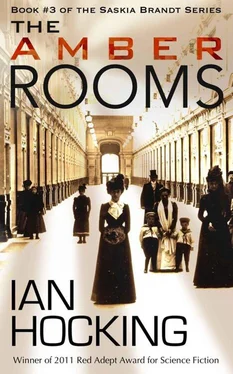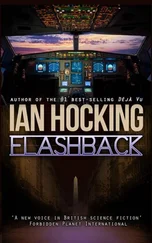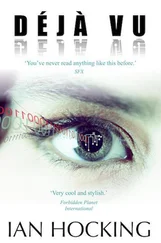And then, across his vision, as though a banner had unrolled, came the words:
i-Core had to shut down unexpectedly.
The woman straightened.
‘Lady Sun?’ he gasped. ‘Is it you?’
His vision was normal again. There was just enough light to reflect in her eyes. They were oriental, like those of Dr Hsieh.
‘What do you see?’ she said.
Beckmann could not raise the gun to her. His arm was no longer his own. His finger pulled the trigger and a cluster of projectiles passed through the lower half of his legs and the floor of the balcony.
He dropped into the night.
He heard her say, ‘The wolf came after all,’ before his limbs returned to his command, and he could wheel them as he fell. He did not scream.
There was enough time to consider whether he deserved this.
He did not know. He never would.
Looking Glass will be available soon.
Probably.
Aliya Whiteley’s Interview with the Author
In this email interview, the questions are asked by novelist Aliya Whiteley and they focus on the research process. Aliya happens to be the editor of the original 2005 edition of Déjà Vu.
Ian, tell me about your research process.
Here goes…
The research for a novel is typically quite secondary to the story — that is, what the characters are going to do to each other and have happen to them. But it is central to the feel of the book. I tend have the feel sorted out first; there might be a period in history that I’m interested in and that period creates a certain effect. The most recent novel I wrote involved a time traveller ending up in Russia towards the end of Tsarist rule. The effect of that is decline, ending, sadness, and a sense of disgust (in me) that fabulously wealthy individuals partied while other starved.
In terms of a timeline, the research took place at the same time as the writing in this case. This is something I try to avoid generally because typically leads to immature, half-baked prose full of anachronisms, and this is precisely what happened with this book! I got about a quarter of the way into it and had to stop because I didn’t know what I was writing about.
The research for this novel has involved learning Russian, finding oral histories written by women at the turn of the century, and watching contemporary movies.
It’s really interesting that you researched and wrote at the same time and found it was a weaker book because of it. Does that mean you usually like to build up a full picture of the time/place before you start — and that makes the novel more coherent in some way? You think the reader can tell when the research has not been done thoroughly beforehand rather than as/when your information needs pop up?
In the case of this book, what happened is that because it was not plotted in advance (I tend not to do this), then I found myself moving towards an area for which I had no information. I believe it was the day-to-day life of St Petersburg in the early 1900s; I also needed to have some detailed plans of the Great Catherine Palace, a huge building near St Petersburg that contains a feature called the Amber Room — that Amber Room was also something I knew I had to research because some important scenes would be set there. I didn’t know which scenes at the time, though.
You think the reader can tell when the research has not been done thoroughly beforehand rather than as/when your information needs pop up?
Hmm, that’s a good question! I think that any writer can probably shape the impressions of a reader so much that the lack of research probably won’t be noticed. At the end of the day, the writer is like a magician — you have to distract and glitz things up so the audience doesn’t twig to the fairly mundane secret behind the trick.
In the case of your last novel, where did you look to find the information you needed? So where did you go to learn a bit of Russian, read oral histories, etc? How did you decide that was what you’d need to know?
For the Russian, I signed up for a local evening class. I studied Russian for two years. I didn’t expect to learn it very well, but I felt ridiculous writing a novel set in Russia without knowing anything about the language. The oral histories showed up on Amazon. The book was out of print — ‘Women Against the Tsar’, I believe it’s called — and described the lives of several women anarcho-bolsheviks in the latter part of the nineteenth century. Another source of information was the writer Roger Morris, who was in the process of writing novels set in the same period of history (though a little earlier). I spoke to him about oral histories and sent him links to some websites…which reminds me, the web was a very useful sources of information. I popped into one or two forums related to Tsarist Russian military uniforms to ask the experts questions about materials, colours, etc.
I also looked on memorabilia sites for clothes that had been owned by people in the time period of interest — these were very good quality pictures with lavish descriptions including the correct terminology (sometimes in Russian as well as English), which is quite important when writing prose.
I love the fact you learned Russian — very immersive! So that’s the kind of research that doesn’t necessarily make it into the WIP so much as flavours it, if you like, would you say? Or in some way makes you feel more prepared to write convincingly about it? Is it the feeling that’s the important part of the process there?
I think you hit the nail on the head with ‘immersion’. I don’t really trust myself to set an interesting story in a place or a time without becoming somewhat expert in it. I’m using the term advisedly, of course — there’s no such in which an English bloke in 2010 is going to become an expert on pre-revolutonary Russia overnight. But I do need to get a sense of how things work, what a person would see walking down a street…In one sense, I have an advantage because my viewpoint character is a time traveller. Her perceptions, therefore, and what she finds interesting or surprising, will somewhat overlap with mine: the constant smell of humanity, the disease in the streets, etc.
That said, I do have my own theory about stories. I think they exist — and should always work — if they are completely abstracted from their setting. So I think that my book should work wherever it is placed because it’s a story about a person who is lost and trying to get home.
And also — you mentioned using books, web sources and also Roger Morris — do you have a type of source that you prefer to use, or think of as more trustworthy? How would you decide that a source is useful to you, or what reasons would make you disregard information from a source?
The sources I find most trustworthy are first-hand accounts because I want the details. What kind of matches are used to light a lamp? What time of day is breakfast? A detailed, pedantic diary is perfect. Books like ‘Natasha’s Dance’ by Orlando Figes are useful because they give a broad sweep of social trends etc., but I’m not sure I want to know too much about those. Nobody in pre-revolutionary Russia knew they were about to experience Soviet rule; some even doubted the revolution would ever come. There’s also a danger that history has n homogenising effect. Just because it seems very linear and inevitable today, doesn’t mean it felt that way at the time.
You mentioned ‘broad sweep’ books and how there’s a danger there in homogenising the writing, (putting in a perspective that couldn’t possibly exist for the character?) — but first hand accounts are more helpful. Where would you go to track down these first hand accounts? A library, or the internet, for instance?
Читать дальше












